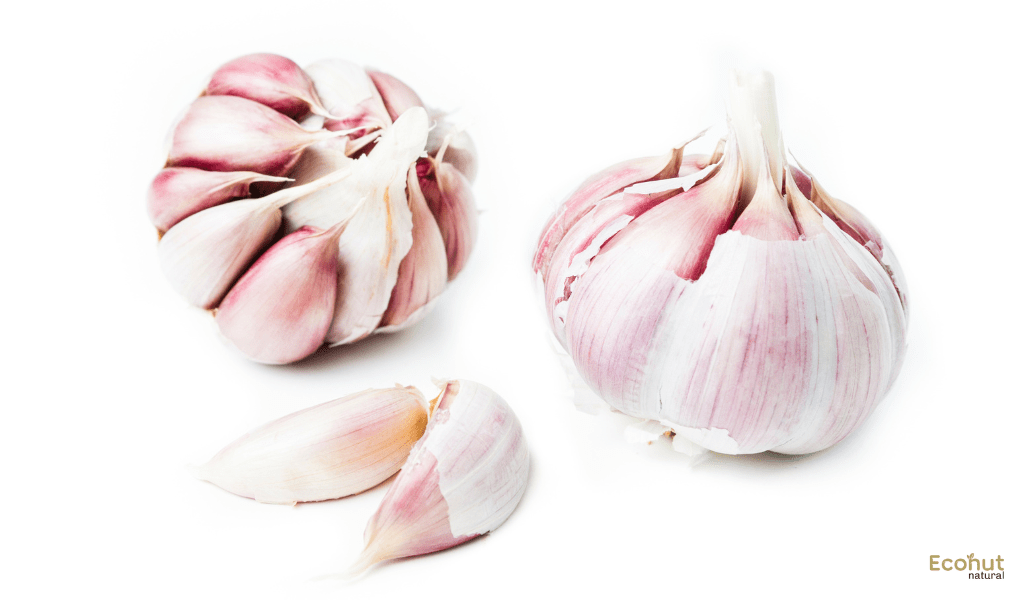Rasona Garlic (Allium sativum) is a species in the onion genus, Allium. It’s closely related to onions, shallots, and leeks. Garlic has been used for thousands of years for both culinary and medicinal purposes. It’s known for its strong flavor and aroma, and it’s a staple ingredient in many cuisines around the world.
Description
We can provide a general overview of the characteristics commonly associated with garlic (Allium sativum) varieties. Here, We discuss some of characteristics.
Bulb Size and Shape:
Garlic bulbs can vary widely in size, ranging from small to large. The shape of the bulb can be round, oval, or elongated, depending on the variety.
Cloves:
The bulbs are composed of individual cloves, each covered in a papery skin. The number of cloves per bulb can vary, with some varieties having fewer large cloves and others having more numerous, smaller cloves.
Flavor and Aroma:
Garlic cloves have a pungent aroma and a strong, spicy flavor when raw. When cooked, garlic mellows and develops a sweeter, more savory taste.
Cloves Color:
Cloves are typically white or off-white in color, though some varieties may exhibit purple or reddish hues.
Harvesting Time:
Garlic is typically harvested when the tops begin to yellow and dry out, signaling that the bulbs are mature. The exact timing can vary depending on the variety and growing conditions.
Growing Conditions:
Garlic thrives in well-drained, fertile soil and prefers full sun. It requires a period of cold temperatures (a process called vernalization) to form bulbs properly.
Scientific Classification
| Kingdom | Plantae |
| Phylum | Magnoliophyta |
| Class | Lilopsida |
| Order | Liliales |
| Family | Liliaceae |
| Genus | Allium |
| Species | Sativum |
Other Names
Latin name: Allium Sativum
Punjabi name – Lasan
Tamil name – Poondu
Urdu name – Lahsun
Hind namei – Lahsun
Bengal name – Loshun
Gujarati nam –: Lasan
Ayurvedic Properties
Hindi / Sanskrit
- Rasa, Madhura,Lavana, Katu, Tikta, Kashya
Guna, Snigdha, Guru, Teekshna
Virya, Ushna
Vipaka, Katu
English
- Taste, Sweet, Salt, Pungent, Bitter, Astringent
Physical Property, Oily, Heavy, Piercing
Potency, Hot
Metabolic Property (After Digestion), Pungent
Rasona, Garlic (Allium Sativum) Benefits
Garlic, scientifically known as Allium sativum, is renowned for both its culinary uses and potential health benefits. Here, We are discuss some of the health benefits garlic.
Contains Antioxidant Properties:
This herb include various Elements, including allicin, which has antioxidant properties. These Elements help combat oxidative stress in the body, potentially reducing the risk of chronic diseases.
Useful In Heart Health:
This herb may have positive effects on heart health by lowering blood pressure and cholesterol levels. Studies suggest that garlic supplementation can modestly reduce blood pressure, especially in individuals with hypertension, and may help lower LDL (bad) cholesterol levels.
Opposes inflammatorys Effect:
Some medical science suggest that garlic may have anti-inflammatory effects, which could help alleviate symptoms associated with inflammatory conditions like arthritis.
Better Immune System:
Rasona has been traditionally used for its immune-boosting properties. It contains compounds like allicin that may help enhance the function of the immune system, potentially reducing the severity and duration of common illnesses like the cold and flu.
Beneficial In Cancer Prevent:
There is some evidence to suggest that garlic consumption may be associated with a reduced risk of certain types of cancer, particularly cancers of the digestive system, such as stomach and colorectal cancer. However, more research is needed to confirm these effects.
Helps For Better Digestive Health:
Garlic may promote digestive health by stimulating digestion and supporting the growth of beneficial gut bacteria.
Contain Antibacterial and Antiviral Elements:
This herb has natural antibacterial and antiviral properties, which may help in fighting off infections. It has been used historically to treat various infections, though more research is needed to fully understand its effectiveness.
Improved Athletic Performance:
Some studies suggest that garlic supplementation may improve exercise performance by reducing exercise-induced fatigue.
Also More: Jatiphala, Jaiphal (Myristica fragrans)
Side Effects of Rasona, Garlic (Allium Sativum)
While garlic (Allium sativum) is generally considered safe for most people when consumed in normal food amounts, excessive consumption or certain forms of garlic supplements may cause side effects in some individuals. Here, We are discuss some side effects regarding garlic.
Produce Allergic Reactions:
Although rare, some individuals may be allergic to garlic. Allergic reactions can range from mild symptoms like itching or rash to severe reactions like difficulty breathing or anaphylaxis.
Interaction with Drugs:
Garlic supplements may interact with certain medications, including blood thinners, antiplatelet drugs, and some HIV medications. It’s essential to consult a healthcare professional before taking garlic supplements, especially if you’re on medication.
Digestive System Issues:
Some people may experience digestive discomfort such as heartburn, bloating, gas, or nausea after consuming garlic, particularly in raw or concentrated forms.
Produce Skin Irritation:
Applying raw garlic directly to the skin may cause irritation, redness, or even burns in some individuals.
Gastrointestinal Disorders:
In Some Medical cases, garlic supplements may exacerbate symptoms in individuals with gastrointestinal disorders like acid reflux, gastritis, or irritable bowel syndrome (IBS).
Bad Breath and Body Odor:
This herb contains sulfur compounds, which can lead to bad breath (halitosis) and body odor, especially when consumed in large amounts.
Avoid during Pregnancy and Breastfeeding:
While garlic used in cooking is generally safe during pregnancy and breastfeeding, high doses of garlic supplements are not recommended, as their safety during pregnancy and breastfeeding hasn’t been adequately studied.
Increases Bleeding Risk:
This herb may have blood-thinning properties, which can increase the risk of bleeding, especially when consumed in large amounts or in combination with blood-thinning medications. People scheduled for surgery should avoid consuming large amounts of garlic beforehand.
Conclusion
Garlic (Allium sativum) stands as a versatile plant with profound health benefits, including its antioxidant and antimicrobial properties. It enhances numerous dishes globally, reflecting its widespread culinary use. Traditional medicine recognizes its potential in treating various ailments.
FAQS
Can garlic help with high blood pressure?
Some Medical Science suggest that garlic may have a modest effect on reducing blood pressure, particularly in people with hypertension (high blood pressure). However, the effect is generally mild, and garlic should not be relied upon as the sole treatment for hypertension. It can be a useful addition to a healthy lifestyle and medication prescribed by a healthcare professional.
Can garlic prevent cancer?
Garlic has been studied for its potential cancer-preventive properties due to its antioxidant and anti-inflammatory effects. Some research suggests that garlic consumption may be associated with a reduced risk of certain types of cancer, such as stomach and colorectal cancer. However, more studies are needed to fully understand the role of garlic in cancer prevention.
How should garlic be consumed for maximum health benefits?
Garlic can be consumed in various forms to reap its health benefits. Some common methods include:
Raw: Consuming raw garlic provides the highest levels of its active compounds, but it may be strong for some people.
Cooked: Cooking garlic can mellow its flavor while still retaining some health benefits.
Supplements: Garlic supplements, such as garlic extract or garlic oil capsules, are also available and may be more convenient for some people.

